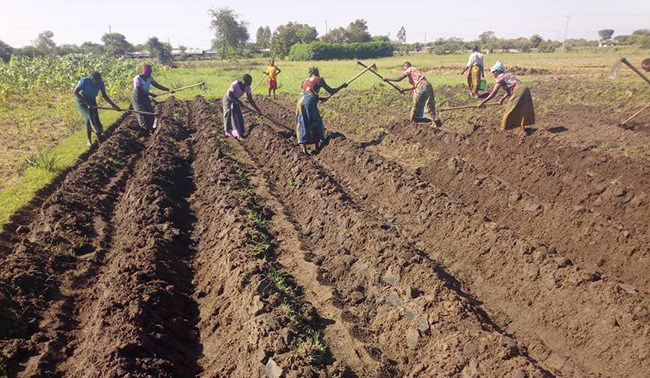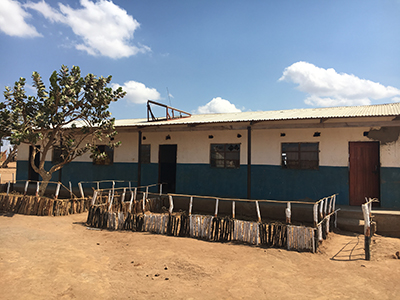About Us │ The AIR Equity Initiative
Our Landmark Commitment
- Statement from the AIR Board of Directors
In 2021, AIR launched the AIR Equity Initiative, a five-year, $100M+ investment in behavioral and social science research and technical assistance to address the underlying causes of systemic inequities and to increase opportunities for people and communities.
At every level of society—from school boards and board rooms to state houses and federal agencies—the nation is grappling with the consequences of systemic inequities. To face these challenges the Equity Initiative aims to foster even bolder, more strategic, and sustained ways to advance equity, especially in areas where investment is limited. We do this by funding inclusive and collaborative research and technical assistance efforts that engage partners from the outset to encourage approaches that can lead to relevant solutions and long-term change.
The Equity Initiative aims to make a substantive improvement in the lives of workers, students, and communities. As the Equity Initiative’s work moves forward, we expect to see improvements in the core issues of our national conversation on equity in education; workforce development; public safety and policing; diversity, equity and inclusion; and eventually, health.
Other AIR-Supported Projects
The Equity Initiative and its precursor, the AIR Fund, supported other projects to improve the lives of people and communities.
COVID-19 Response
AIR leveraged its funds and expertise in education and healthcare to document and inform responses to the COVID-19 pandemic. With input from providers in the field, AIR designed rapid research projects to help community members, decision-makers, and organizations understand the complexities of this crisis. Four evidence-building studies about COVID-19 include:
- National Survey of Public Education’s Response to COVID-19;
- California Dual-Language Learners Study;
- Investigating Health Care Hesitancy During the COVID-19 Public Health Emergency; and
- Continuity of education plans in Pennsylvania.
 Testing an Agriculture Intervention’s Effect on Maternal and Infant Health in Tanzania (2017-present)
Testing an Agriculture Intervention’s Effect on Maternal and Infant Health in Tanzania (2017-present)
According to UNICEF, approximately 161 million children experience stunted growth because of inequitable access to food and balanced diets. Efforts to address this disparity have led to favoring production of a small set of crops (such as rice, corn, and wheat) at the expense of diverse, nutrient-dense, indigenous plants. AIR is testing the impact of a new intervention designed to reintroduce orange-fleshed sweet potatoes—a “neglected” crop—to help reduce child malnutrition and vitamin A deficiency in Tanzania.
The Zambia eSchool 360 Expansion Project: A Program That Aims to Improve Education in Zambia (2016-present)
The eSchool 360 program model, implemented by the Impact Network and supported by AIR, increases educational access and quality through technology and training in rural Zambia. This project expanded from nine to 44 schools with a staff of 157 teachers and 6,000 students in a school year. Through this effort, AIR is providing new educational and job opportunities for learners and community members in rural Zambia.
 The Zambia eSchool 360 Evaluation Project (2016-present)
The Zambia eSchool 360 Evaluation Project (2016-present)
Low- and middle-income countries have made significant strides in getting children into school, but that has not always translated to educational achievement. Of the approximately 250 million children across the world who lack basic math and reading skills, about half have spent at least four years in school. Impact Network’s eSchool 360 Program, which was implemented in Zambia, aims to improve the quality of education by incorporating three components: e-learning, ongoing teacher training, and community ownership.
Changing the Trajectory for Infants and Toddlers Exposed to Abuse and Neglect (2017-2020)
Each year more than 400,000 children are removed from their homes and enter foster care, placing them at high risk for poor developmental outcomes. To address this issue, ZERO TO THREE created the Safe Babies Court TeamTM (SBCT) approach, which aims to reduce the time until a child in the welfare system reaches a safe, permanent home. AIR conducted a natural experiment that tested the impact of the SBCT approach on the time children spend in foster care, the rates of recurrences of abuse or neglect, and family and child well-being.
Early Language Home Visiting Study (2017-2020)
Consistent, correct use of evidence-based practices by practitioners, such as home visitors, can help improve children’s outcomes. AIR conducted a randomized control trial pilot study with a small sample of children, families, and home visitors to evaluate the impacts of an early language intervention, PC TALK, on children’s early language development. The findings showed that home visitors enhanced their professional competencies through study participation. In addition, the study found documented improvements in parents use of language development strategies.

Enhancing the Oral Language Proficiency of Young Dual-Language Learners in High Poverty Schools (2016-2020)
The goal of this project was to develop and pilot test methods and materials that enhance the oral language proficiency of young children who are dual-language learners. The project—Cultivating Oral Language and Literacy Talent in Students (COLLTS)—consists of professional development in evidence-based teaching methods and curriculum for preschool teachers and family literacy activities of 3-year-old, Spanish-speaking dual-language learners.
Evaluating the Effectiveness of an Early Math Learning Program (2017-2020)
Studies find a consistent gap in math achievement, starting as early as kindergarten. This study developed and evaluated a math learning program for 2- and 3-year-old children that provides parents with resources and developmentally appropriate activities through their smartphones. AIR researchers conducted a randomized controlled trial to evaluate the intervention.
Examining the Link Between Awareness of Family Leave Policies and Health Outcomes (2016-2020)
Access to family leave may contribute to positive health behaviors, such as well-child visits, immunizations, breastfeeding, and other preventive health care services. This study examined the link between awareness of family leave policies, use of paid and/or job-protected family leave, and maternal and child health. It is the first study to examine this relationship using medical health records, among other data sources, and it deliberately oversampled African Americans, Spanish-speaking individuals, and those who receive Medicaid benefits. Findings are being reviewed and will be released soon.
Project Talent Supplement (2016-2020)
Project Talent is the largest and most comprehensive study of high school students ever conducted in the United States and is now the largest and longest longitudinal life course study. The study participants, who were initially surveyed in 1960, are moving into retirement, and Project Talent has become a resource for understanding the aging process, allowing participants to continue involvement in this remarkable and historic study.

Supporting a Citywide Strategy to Improve Access to College and Career Success (2016-2017)
For low-income students, access to a postsecondary degree continues to be a barrier to economic mobility. A grant to Say Yes to Education focused on planning activities for the establishment of the Weiss Institute, which aims to increase postsecondary degree completion through scholarships and other support services. A key element of this approach includes the implementation of interagency and cross-sector strategies to bring together stakeholders—including city and county governments, school districts, teachers, businesses, colleges, and universities—to drive powerful community outcomes in postsecondary degree completion.
More About Generating and Using Evidence
Generating Evidence to Advance Equity
The Equity Initiative identifies and invests in research that centers on equity and holds promise for informing ways to improve opportunities and outcomes, and in ideas or approaches that receive little attention or funding from others.
Using Evidence for Equity
AIR builds the connective tissue between evidence and its use and help promote better outcomes. Equity Initiative investments will facilitate seamless transitions between the scholastic and the practical, and aid the development of structures, tools, and processes that support the use of evidence in policy and program implementation.
